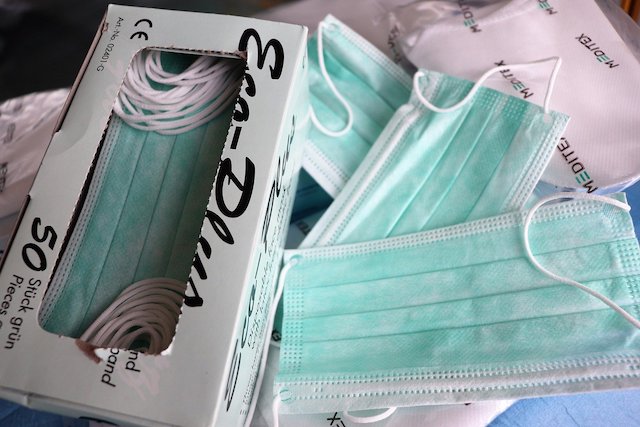Health Minister Didier Gamerdinger has revealed more details of the government’s plan for returning life back to “normal” after confinement, including the availability of cheap masks for employers to purchase for their workers.
As the Covid-19 virus begins to slow its march through the population, Monaco’s Minister for Social Affairs and Health announced in a press briefing on Thursday 23rd April the preparations that are being made for life post-confinement.
The three-pronged plan includes no surprises. Masks, screening tests and digital tracing will all be the hallmarks of de-escalation in the Principality.
The procurement of masks has been a point of concern since the start of the health crisis. A secure and reliable supply of masks has now been obtained, so every resident will have access to medical masks until they are no longer required. Obtaining the masks was an arduous process however, according to the minister, and fraught with trouble. Mr Gamerdinger revealed that scammers attempting to sell sub-par masks without proper safety certifications were a problem that the government had to overcome.
“We have succeeded in securing supply chains,” said the minister. “To date, in stock in Monaco, we have 3.6 million surgical masks and 274,000 FFP2 masks. And we have over €9 million worth of masks on order.”
Two free cloth masks per resident and disposable masks for employee are slowly becoming available. Video tutorials on how to maintain and wear the masks are broadcast on the government’s Facebook page and the Monaco Info channel.
“We are thinking about distribution on a very large scale, therefore our entire population and all our employees,” added Mr Gamerdinger. “The idea is to protect everyone.”
Cloth mask distribution for all residents aged 16 to 65 is in progress and deliveries by La Poste is expected to end Thursday 30th April.
Employers will be able to buy single use disposable masks at cost (1€ plus VAT) from the government. Distribution has already started through employers’ organisations.
The government has established an ordering process for employers on its website.
Wearing a mask will not be mandatory, but with access to affordable protective gear, the government is hoping most people and companies will comply.
Widespread screening is also in the works. The government plan is to “look at what the epidemiological status of residents and employees of the Principality are, so we can quickly tell a person if they are positive or not, isolate them and confine them if necessary.”
A new automaton converted by the Monaco Scientific Centre will allow for more tests to be processed faster in the coming weeks. The minister disclosed that a company based in Monaco has also recently filed a patent on a new test what has allegedly been able to isolate proteins from the virus. Blood tests are also being ramped up – 1,000 tests have been delivered and are being checked for uniformity. Once this is complete, an additional 30,000 tests will be arriving from a company out of Hamburg, with the possibility of obtaining an additional 20,000 if needed.
The last component toward a safe post-lockdown period is digital tracing. The government is considering using geographic tracking software on smartphones following similar experiments in Singapore and Hong Kong, and those zplanned for Germany and France.
“It’s a system that you download to your phone. We activate the Bluetooth function and your phone will record the coordinates of all the phones you are close to when you are traveling,” explained Mr Gamerdinger. “You then indicate if you are positive and the system will notify all the people with whom you were in contact. This allows them to be invited to be tested if they have symptoms.”
The government is also looking at Google and Apple, two companies with vast tracking experience who are working together to develop a mobile application to track Covid-19 patients and alert people in contact. Again, usage will be voluntary, especially as many people are sensitive to their privacy protection and individual freedoms.
Photo: Pixabay
